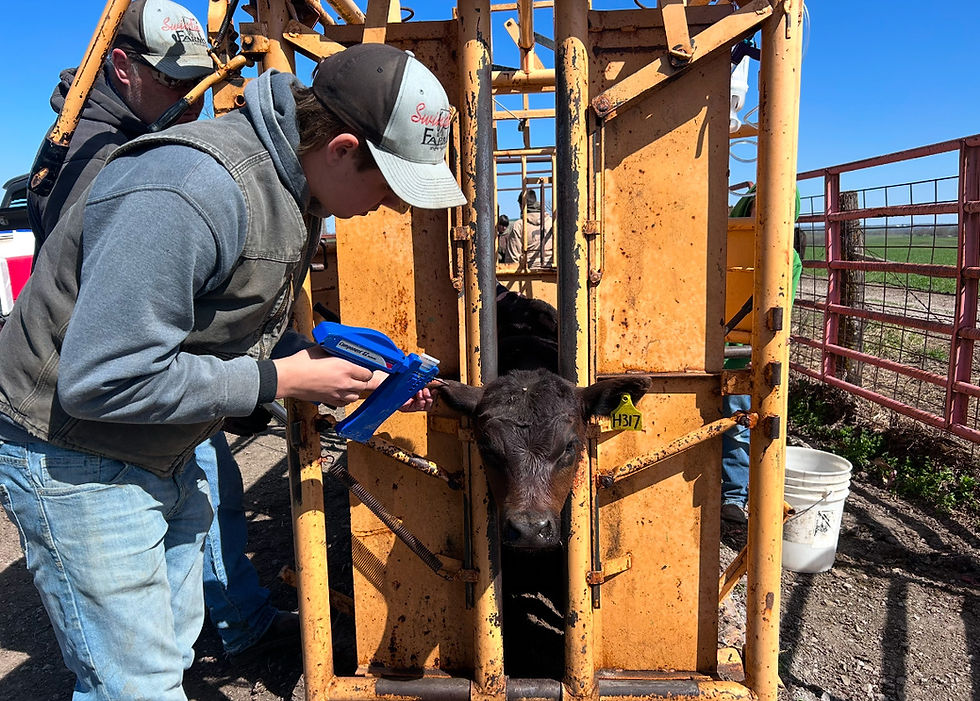Meet the Future | November 2025
- Oct 20, 2025
- 4 min read
By Sarah Hill
photos courtesy Swindler family
University of Missouri freshman and State FFA officer Gage Swindler forges his own path in the cattle industry.

It’s hard to say what the future of the beef business holds, but one thing we know for sure is that there are young people willing to step up and take on leadership roles. One of those young people is Gage Swindler from Braymer, Mo. A freshman at the University of Missouri in Agribusiness Management, Swindler also serves as a Missouri FFA State Vice President.
Swindler grew on his family’s Angus and Gelbvieh cow calf operation owned by his grandparents, Dale and Ruth Ann Swindler, and his parents, Justin and Erika Swindler. Gage is the fifth generation on the operation. Through the 80’s and 90’s the farm was focused on swine and row crops, but in the mid 90’s switched from swine to cattle. While in high school, Justin was tasked with developing the cattle herd into what it is today.
“My grandpa only had a handful of cattle, and as the hog market crashed in the 1990s and my dad joined the operation, we started slowly adding to where it is now,” Gage Swindler said. “Today, there are 250 head in our herd.”

Structural Soundness, Docility are Key
The Swindler family’s cattle herd was primarily Angus for many years, but about 12 years ago, they began adding Gelbvieh genetics to the herd to cross for Balancer calves. The herd is about a quarter Gelbvieh today.
“They were really good cattle, and we knew the Gelbvieh breed offered a lot of opportunities in showing and for juniors,” Swindler said. “We decided we loved the breed and kept growing it in our herd.”
Swindler said the family strives to breed the best cattle possible, with structural soundness, profitability, and docility.
“Better cows raise better calves. Docility is very important to us, since we work with them a lot and want them to be calm and gentle-natured,” he said. “We also cull very hard on structure, and we also want cattle with fast growth that are stout made and functional and have good milking ability.”
The family uses AI and embryo transfer to improve the herd’s genetics. In his drive to push for constant improvement, Swindler took to showing his animals.
“I enjoy showing the cattle we raise at local, state, and national shows,” he said.
Beef cattle were an integral part of Swindler’s supervised agricultural experience (SAE) in FFA, as part of a diversified livestock operation including a cow-calf cattle herd, a farrow-to-finish Berkshire and Chester White swine operation, laying hens and broilers. The 2025 Missouri State FFA Convention was an exciting one for Swindler, who also competed on the state-winning livestock judging team, in addition to being named a state FFA officer.

Although he’s now away at college, Swindler said he’s still helping make choices on breeding, marketing and general direction for his family’s cattle herd and his own cattle, while also furthering his knowledge on the beef industry in every way he can.
“We just weaned calves, and will soon start sorting which replacement heifers to keep and sell,” he said.
Living away from home at college is Swindler’s first time living in a more urban area and being surrounded by people without any knowledge of agriculture. This scenario presents him with numerous opportunities to meet new people and have conversations with them about the beef industry, educating them on where their beef comes from. At college, Swindler is a member of Alpha Gamma Rho fraternity and participates in Collegiate Farm Bureau and the Agribusiness Club.
Looking ahead, Swindler said he plans to pursue a career in agriculture while continuing to work on the family farm and growing his own cattle operation. Swindler said he and his three younger brothers are all committed to maintaining the family farm and cattle herd.
Swindler also takes advantage of being in nature during his spare time. “I enjoy hunting and fishing every chance I can get,” he said.

Thoughts on the Beef Industry
Swindler shared his thoughts on the biggest challenges facing young people in the beef industry today.
“The decrease in pasture acres is a big challenge,” he said. “More pasture is being tilled up for row crops, which makes it harder for younger cattle producers to expand their operations. With cattle prices at an all-time high, it can make it harder for younger producers to buy heifers and cows to use to build their herds.”
The future leader encourages other young people to get involved in the beef industry and explore all of the opportunities the industry has to offer.
“There are a variety of jobs that are necessary for the beef industry to be successful, and with the labor shortage, there is no better time than now to get involved,” he said.
Swindler also shared words of advice for other young people looking to a career in the beef industry. “It may not always be the easiest way of life, but if you stick with it and work hard every day, then you have a good shot of it paying off,” he said.

Comments